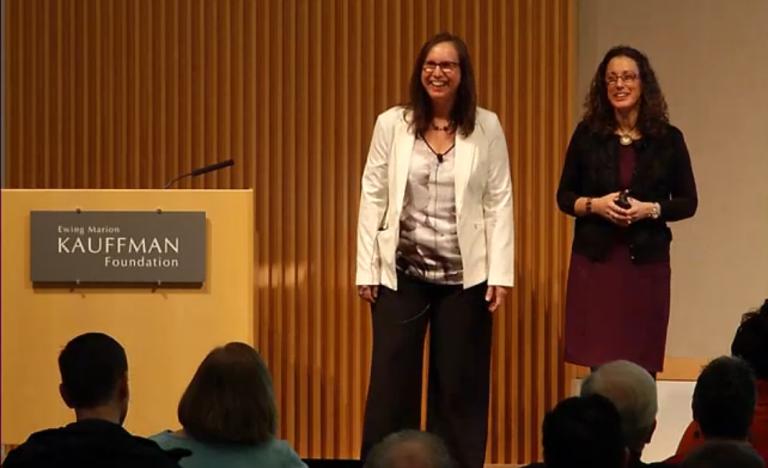This week’s 1 Million Cups presentation at the Kauffman Foundation featured a pitch by a two-woman startup producing handmade jewelry from repurposed objects and another pitch by a company using 3D motion-capture technology to evaluate the physical abilities of individuals.
HangUps in KC co-founders Carolyn Adams and Kristi Jurgensen showed a video of them shopping in antique malls and other out-of-the-way places in search of old items to turn into personalized necklaces and bracelets.
“Our jewelry actually hangs on you—it’s whimsical,” Adams said, explaining the company’s name.
Leather belts, spoons, forks, keys, buttons—you name it—Adams and Jurgensen can turn almost anything, they said, into custom jewelry that typically features a famous or otherwise meaningful literary quote.
“We love to repurpose,” Adams said, and “reach out to people who love books and book quotes and refurbished jewelry.”
Jurgensen said: “Our jewelry is fun, inspiring and unique.”
Priced from $20 to $60, the duo’s jewelry is available online at hangupsinkc.com and at five Kansas City area boutiques: Catfish & Tater, Lulu’s Boutique, the Westside Storey, Lucky Dog Vintage and Ugly Glass & Co. One of the company’s goals this year is to expand into the wholesale market.
Next up was Patrick Moodie, co-founder of Dynamic Athletic Research Institute (DARI), who explained how his company uses cutting-edge 3D motion capture technology and biomechanical algorithms for athletic, health care and military applications.
Moodie began his pitch by narrating a live video demonstration of a woman jumping in a room equipped with 3D motion cameras at his company headquarters in Lenexa. The video showed how the woman’s movements could be objectively measured in real time and quickly evaluated, and how the data could be utilized by sports teams, trainers, rehab professionals, doctors and others.
Moodie said his company’s flagship sports client was an Australian Rules football team in Melbourne, Australia, for which DARI provides a weekly full-team diagnostic of 30 to 50 players. Because of the company’s patented processes, he said, the diagnostic takes only two hours to complete, rather than weeks or months.
To optimally evaluate a person’s range of motion using the company’s technology, Moodie said, a healthy or pre-injury baseline for that individual should first be established.
“We compare you to you … not you to an industry standard,” he said. “We want to get to individualized medicine.”


